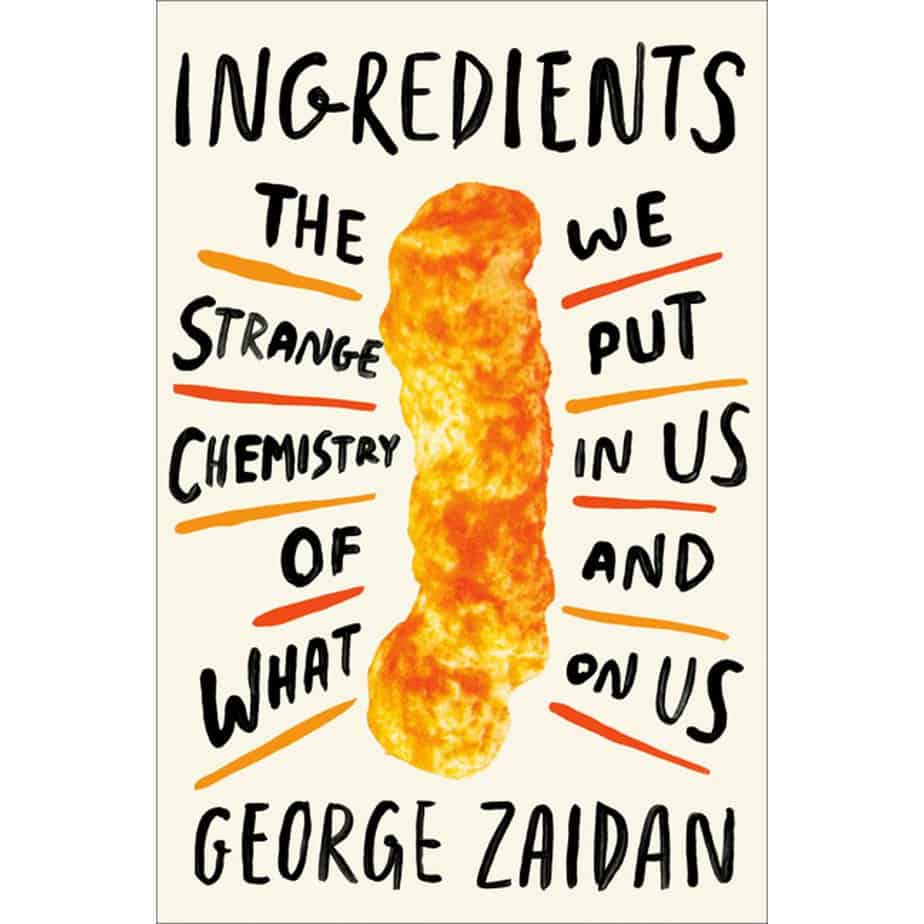
This new book is so entertaining, you won’t even realize you’re learning about chemistry. George Zaidan, science writer and television host, writes with casual humor, and illustrates his book with his own hand-drawn sketches.
However, this book was not what I expected, based on the title and the cover, which features an image of a giant Cheeto. I thought the book would be about, well, Cheetos, and other junk food, and cosmetic products, and how good or bad they are for us. And the book is about those things, to an extent. But even more, this is a book about the scientific method.
Zaidan doesn’t simply provide answers. He wants the reader to understand the strength of evidence on given questions like “is junk food bad for us?” and “does sunscreen protect us from cancer?” He devotes an entire chapter to how we know that smoking is bad for us. It may seem self-evident now, but for decades this was disputed. It’s often quite difficult to prove that anything harms or helps us, and to what degree. There are too many variables that are difficult to control.
Zaidan’s explanations of how science works, and how to critically evaluate scientific studies, are clear and interesting. Just know that you will spend more time learning about these things than learning about what to eat or put on your body.
As a coffee addict, I was excited to read the chapter entitled “Is Coffee the Elixir of Life or the Blood of the Devil?” Frustratingly, the author does not provide a conclusion regarding the healthfulness of coffee, or even an opinion. The author uses the history of conflicting research on coffee to make the point that it’s difficult for science to provide definitive answers. He provides excellent explanations of associations and probabilities; but offers but no conclusion on the coffee question.
One of the most interesting chapters is on food preservation, which Zaidan compares to corpse embalming: “If you’ve ever enjoyed dried and salted cod, you’re eating the corpse of a fish preserved in approximately the same way as the ancient Egyptians preserved the corpses of their kings, except, instead of table salt the ancient Egyptians used natron.” He also tells the story of aphids and their honeydew poop, eaten by animals and people, to further make the point that some food processing is natural and necessary.
One of the book’s most provocative ideas is that sunscreen may not be worth using. He doesn’t say sunburn is OK, but advises minimizing time in the sun that could lead to sunburn. Sunscreen makes us stay in the sun longer, he points out, often leading skin to become sun-damaged in spite of the sunscreen. And there are insufficient studies on the safety of chemicals in sunscreens that get into our bodies through our skin.
The answer to the question of whether or not you should eat that Cheeto comes in the very last chapter of the book. Spoiler alert: processed foods are not good for you. More interestingly, Zaidan attempts to answer the question of “how not good for you are they?” And he provides a very specific answer: for every 10 percent increase in the proportion of ultra-processed food in the diet, the annual risk of death goes up by 14%. This translates to about 1.3 years of lost life for every 10% increase in processed food in the diet.
Which, you may be thinking, is not as bad as you thought. Maybe even worth it, to keep potato chips, Oreos and Cheetos in your life?
As a certified nutritionist and health food nut, I’m dismayed by this. Not because I want people to be sicker from junk food. But such conclusions don’t take quality of life into account. Even if one doesn’t develop diseases like diabetes or cancer from a lifetime of eating junk food, one likely would not feel one’s best.
Zaidan sums up his thesis in the last chapter by saying, seemingly to those of us who tirelessly champion healthy behaviors: “Relax, dude.”
But just like many people surmised that smoking wasn’t healthy before it was proven by science, it doesn’t take decades of rigorous research to know that you are better off eating an apple than a Cheeto.
So, this book offers counter-intuitive advice—don’t worry too much about junk food or sunscreen. This may come as a relief to some people who are made anxious by the dire warnings of health zealots. But it also may give excuses to those looking to give up on healthy habits.
This book is a great read if you’d to learn more about science and the scientific method, as they relate to ingredients in consumer products. I am not sure his perspectives will make us more healthy, but they will provide welcome balance to debates about health advice.
